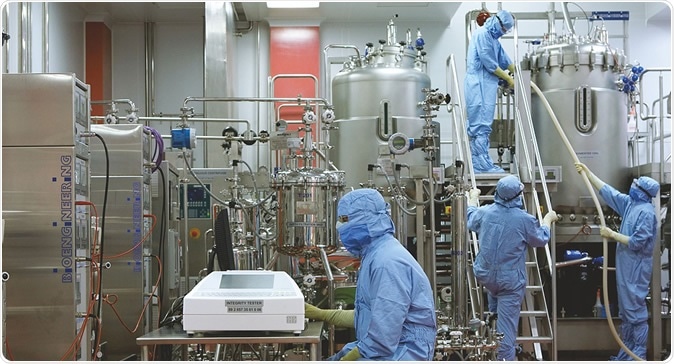Serum Institute of India
The more than 50-years-old company, which produces and sells the highest number of vaccine doses in the world, makes 1.5 billion doses annually and employs over 7,000 workers. It mainly operates from its two facilities in Pune, although it does have two other small plants in the Netherlands and the Czech Republic.
It exports 80% of its products - around 20 vaccines to 165 countries, selling them at an average of 50 cents a dose, which makes them among the most affordable in the world.

Vaccine Manufacturing. Image Credit: The Serum Institute of India
The Indian Vaccine Manufacturing Sector
India produces a large percentage of the world's generic drugs and vaccines. Its growing pharmaceutical industry is home to several major vaccine makers, producing vaccines against common infectious diseases - polio, meningitis, pneumonia, BCG, measles, mumps, and rubella, among others.
Many of these manufacturers are now engaged in the global race to find a vaccine. Bharat Biotech has teamed up with U.S. researchers and biotech companies to develop almost 300 million vaccine doses. Zydus Cadilla, Biological E, Indian Immunologicals, and Mynvax are among the major pharmaceuticals in the process of vaccine development.
The U.S has collaborated with India on many vaccines for over 30 years, such as Dengue, enteric diseases, influenza, and tuberculosis. Trials on a Dengue vaccine are being planned.
Soumya Swaminathan, chief scientist of the World Health Organization (WHO), comments: "The credit must go to entrepreneurs and pharmaceutical companies who invested in quality manufacturing and in processes that made it possible to produce in bulk. The owners of these companies have also had the goal of doing good for the world, while also running a successful business and this model is a win-win for all."
Serum Institute and COVID-19 Vaccines
Serum Institute of India is now collaborating with Codagenix, an American biotech company, for a live attenuated vaccine candidate. The vaccine is in the preclinical stage, being tested on mice and primates. The project is estimated to cost around $41.9 million and to be in the market by early 2022.
Serum Institute is also a partner with Oxford in the mass production of the new engineered chimp-virus-based COVID-19 vaccine being developed by the latter.
According to media reports, chief executive officer of Serum Institute of India Adar Poonawalla stated that animal trials on mice and primates are in the planning stage, and human trials should begin in September if all goes well.
"Our team has been working closely with Dr. Hill from Oxford University, and we are expecting to initiate production of the vaccine in 2-3 weeks and produce 5 million doses per month for the first 6 months, following which, we hope to scale up production to 10 million doses a month," he said.
If all went well, they would aim to produce 20-40 million doses per month by September-October, he added.
Planning for the future
As economies over the world are in lockdown, trying to curb rising infection rates, experts predict millions of vaccine doses will be required to halt transmission of the disease. Indian vaccine makers are prepared for extra production, with the Serum Institute alone boasting an extra capacity of 400 to 500 million doses. Poonawalla attributes this to foresighted investment in capacity building.
Poonawalla said the company had decided not to wait till the U.K. human trials were completed, but to "jumpstart" production at their own risk. "Keeping the current situation in mind, we have funded this endeavor at a personal capacity and hopefully will be able to enlist the support of other partners to further scale-up the vaccine production," Poonawalla said.
Affordable vaccines for the world's needs
The vaccine will sell at around Rs. 1000 in India, he says, enough to cover the firm's production costs. The existing Pune plant will be dedicated to the COVID-19 vaccine as otherwise, the new plant would take a couple more years to start operations.
The company's decision may have a significant bearing on the pandemic if Oxford's human trials prove successful. The institute is spending significantly on the project, and says it hopes "the government will partner by stock-piling the vaccine." It has not only lost a potential $60 million by stopping the production of other vaccines, but has spent an equivalent amount on the new plant, and will spend more on the clinical trials and new vaccine production.
The firm says that beginning production pending trials will help ensure that enough doses are available in the future if the trials prove successful. He added that all global and national safety and efficacy regulations were being followed.
He also emphasized the need for global collaboration in vaccine production, stating that Serum Institute would not patent any vaccine it was likely to develop, making it free for global producers to manufacture and sell. This would speed up the process of production, allowing billions of doses to be produced and sold at a lower cost.
"I hope that whichever company develops the vaccine does not get it patented and makes it available based on royalties or a commercial understanding to as many manufacturers across the world to make billions of dosages at a fast pace," Poonawalla said.
Indian regulatory authorities are working with the company to ensure smooth procedural functioning. "We are in touch with the Department of Biotechnology (DBT) and Indian Council of Medical Research (ICMR)," Poonawalla said.
As of 28 April, global COVID-19 cases have surpassed 3 million, of which nearly 2 million are active cases, with over 211,000 deaths.